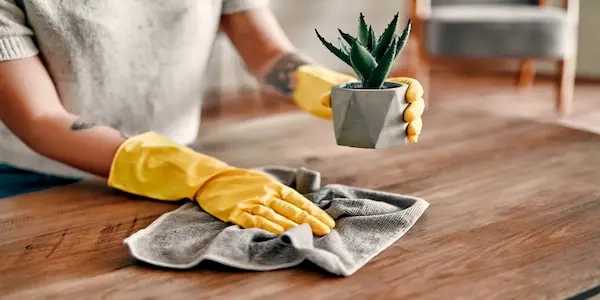
Molly Maid recommends regular dusting to maintain a clean, healthy home environment.
|
An Age-Old Question
Some questions just never seem outdated or irrelevant. “How often should I dust my house?” is one of them. And depending on a few variables, the answer might be a little bit different for each person and home. However, the one thing that’s true for everyone is, dusting on a fairly regular basis can significantly reduce the amount of time and energy you spend keeping your home clean and free from allergens. But should you dust daily, every few days, every other week, or just occasionally? Take a look at some of the things that affect the dusting dilemma and settle on an answer that works for you.
The Sneeze Factor
Everyone knows that dusting is a necessity. But the question remains, how often should you dust? To answer this question, you’ll need to answer a few other questions first. For example, do you have a central air unit in your home? If so, how often do you clean or replace the HVAC filter? Letting your HVAC filter go too long between cleanings or replacement will increase the amount of dust that circulates and eventually settles in the home. If you add a few pets and children to this equation, the dust factor will increase exponentially. In addition, if you live in an area that allows you to keep doors and window open for a while—to take advantage of fresh air circulation—this is a double-edged sword. Yes, all the fresh air is great for air circulation, but it sometimes carries other less desirable elements like airborne allergens, like pollen, animal dander, dust mites, etc. All these things can contribute to the amount of dust that eventually settles in your home, which increases the sneeze factor—the body’s reaction to expelling irritants in our nose and throat.
Letting the Dust Settle—And Some Ways to Reduce It
Now that the dust has settled, and you’ve identified a few of the variables that can increase the amount of dust in the home, it’s time to dust off a few suggestions.
Clean Your HVAC Filter and Ducts Regularly
Keeping your HVAC filter clean and maintaining a regular cleaning schedule will go a long way to reducing the amount of dust in the air, which will also reduce the amount of dust that eventually settles in the home. A HEPA (High Efficiency Particulate Air) filter can trap up to 99.97% of 0.3-micron particles, which means these filters are pretty effective at trapping most, if not all, airborne particles. Installing on one these filters in your HVAC system will go a long way to reducing dust. In addition to cleaning and replacing your HVAC filter, cleaning HVAC air ducts can also significantly reduce airborne dust particles. It’s a good practice to have air ducts cleaned and inspected each spring and fall to ensure they are clean and connected properly.
Vacuuming Regularly
Maintaining a fairly regular vacuuming schedule will also help reduce the amount of dust in the home, with one exception. Failing to empty or replace your vacuum bag or canister after each use might actually add more dust into the air. The whole purpose of regular vacuuming is to reduce the amount of dust, not add to it. So, if you notice an odor or begin sneezing every time you vacuum, it might be time to clean the canister, replace the bag, or replace the vacuum.
Use a Damp Cloth for Dusting
When you dust, make sure to use a damp cloth or a material that will attract and hold the dust rather than put it back into the air to eventually settle again. A damp microfiber cloth usually works best. Make sure the cloth is not too wet to avoid leaving wet marks and/or streaks on wood furniture.
So, How Often Should I Dust?
Dust frequency really comes down to a matter of personal health. It’s safe to say that the more frequently you dust, the cleaner our home environment will be from potentially harmful allergens. But everyone reacts differently to the environment around them. People who suffer from allergies should dust more frequently—especially during seasonal peaks. Start with once a week and see how you react. The same holds true for households with small children and pets. All the activity increases the dust level, allowing more dust to build up over a shorter period of time. People who don’t suffer from allergies and don’t have children or pets can probably cut back their dusting to every other week, depending on personal preference.
Breathe Easy
Although there are many health benefits associated with dusting more frequently, dusting might also come down to a matter of appearance. Most of us would cringe at the thought of entertaining family, friends, or guests in a dusty home. We would all prefer to live in a home that could pass even the strictest white glove test. Unfortunately, not all of us have the time to devote to dusting as frequently as needed, but there is a solution. Contact Molly Maid for hassle-free, regular, cleaning services. We’ll do the dusting—and clean the rest of your house too. Use Molly Maid’s neighborly cleaning service to help get your home looking spotless, so you can breathe easy.
